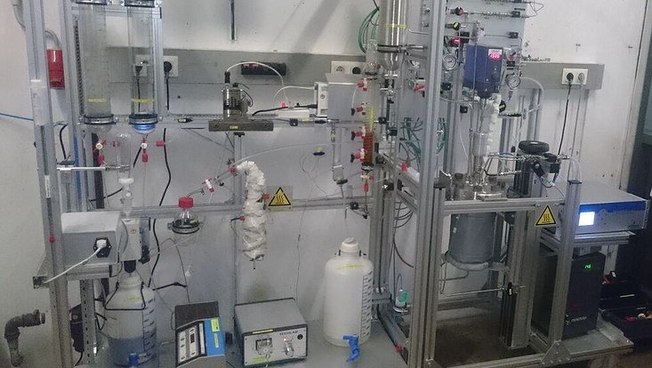3 February 2023
ERC Consolidator Grant at Universität HamburgReplacing fossil fuels used in the chemical industry with biomass

Photo: Private
Carboxylic acid esters are used to produce a variety of everyday products such as packaging, clothing, fruit flavorings and preservatives as well as active ingredients for pharmaceuticals. The carboxylic acid esters themselves are currently mainly obtained from fossil fuels. The aim of the BioValCat project led by Prof. Dr. Jakob Albert for which the ERC grant has now been awarded is to develop an industrially viable process to extract carboxylic acid esters from biomass.
“Our vision is to produce platform chemicals from real biomass, so from waste products generated in the industry for instance,” explains Jakob Albert, Chair of the Professorship for Technical Chemistry at Universität Hamburg. While fossil fuels have a very simple chemical structure and can easily be processed and assigned other characteristics, biomass has a very complex structure and already affords many different characteristics on the molecular level. “Chemically, it is far easier to add characteristics than it is to extract them though,” Albert explains.
Over the course of the project, Albert and his research group will use laboratory experiments in reactors to explore the use of polyoxometalates dissolved in water. These are added to plant-based biomass as catalysts to obtain carboxylic acid esters. Polyoxometalate catalysts offer the advantage of being adaptable and flexible in their use, allowing them to be tailored to the composition of the biomass, which is constantly changing due to the varying environmental conditions.
“Congratulations to Prof. Dr. Jakob Albert on this outstanding achievement. There’s hardly a more preeminent acknowledgment for excellent cutting-edge research in Europe. The project complements our core research area of Climate, Earth, Environment, which is the source of impetus for the future, and also Universität Hamburg’s extensive sustainability agenda. I would also like to thank the Department of Chemistry and the MIN Faculty,” says University president Prof. Dr. Hauke Heekeren. He adds: “This brings the number of ongoing ERC-funded projects at Universität Hamburg to 28. This total is continuously increasing and we wish to pursue this successful course in the future.”
Research will begin within the BioValCat project on 1 September 2023, with the Consolidator Grant from the European Research Council (ERC) enabling the creation of 5 new positions within Jakob Albert’s team.
The University Medical Center Hamburg-Eppendorf has successfully won a further 2 ERC Consolidator Grants for the same funding period. One of the projects will explore the microstructure of the human brain; the other will consider the question of how the environment affects our well-being and mental health.
About the funding
With its Consolidator Grants, the European Research Council (ERC) funds researchers who completed their doctoral studies in the past 7–12 years and recently established an outstanding research group. Projects run for 5 years and aim to facilitate the independence of excellent researchers and their working groups. A total of €657 million was awarded in the current funding round for research all across Europe.
